
This is a Kwoma tumbuna story, known as Makapasapa, Masakamba or Sasaap. I heard it from David Kaipuk, a Kwoma elder, on my first expedition along the Sepik. Then, he told me only a part of it, saying that the rest belongs to other clans. Afterwards, I saw motives from the Makapsapa myth painted and carved inside the tambaran, and even on the posts of the Ambunti market.
In 2015, I recorded the complete story from Robin Chiphowka Kowspi and Roni Agatoak Kowspi, on a long afternoon in front of their porch, in Ambunti. They took me to Jakson Yangas Vikapa and Albert Vikapa for details of the part related to their clan.
The story has four parts, each one having a singsing. I translated it as I recorded it. I removed the repetitions and some dialogues which occurred during storytelling.
Before reading the story, it might help to check the glossary and the captioned photos here.
Kumul mery – Birds of paradise women
Makapasapa’s story goes like this.
He looks weak and sick, and his skin is sore. All-day long he stays home and doesn’t work. When his wives go out for food, they ask him to join. Ooh, look at my body, I don’t feel good today…
They go into the forest, they tie the fishnets, they look for greens, they do all the work. He just stays to sleep.
Once they are out, Makapasapa wakes up, removes the bad skin and follows them into the forest. He catches one wife, has sex with her, and then rushes back home. While his two wives are still in the forest, he puts on the bad skin and goes to bed waiting for them.
– Ooo, you came back?
– Yes, we just arrived. You?
– I still don’t feel well. I sleep, and he turns his back upside.
He asks them to bring dog meat, so they go and kill a dog for him. But he doesn’t it. He lets it to rotten, gets full of worms, and asks something else. He asks for sago grubs, they bring sago grubs. Oh, no, I want pork! So, the two hunt a pig. I don’t like it, I want to eat fish. And they go to bring him fish.
Day by day, the women struggle to find him food. When they are gone, he removes the bad skin, becomes a handsome man, and goes into the forest to make sex with them. One day with one, the next with the other one.
They wonder: When can we find a good man, one who helps us? They try to speak to him, hoping he will become a true man. But he keeps doing the same.
One morning, one of the wives hides and watches him. The man removes his skin, and she sees him leaving the house after them. Hmmm…
In the afternoon, on the way back, she tells the other one.
– You know, our man has a nice body, and is doing like this, and like this. He is giving us a bad time!
The wives keep it secret, and the next morning talk to him.
– You don’t feel good? Ok, you stay and sleep, we go to find food.
Now they have made their minds.
They go into the forest to prepare everything. They take tulip fibres and make rings, take mangas (a tree) and smash it to get stiff ropes, collect grass, fetch water, and all they need. They put the tulip rings on their arms, and tuck the mangas ropes onto their sides, making wings. They tighten all well and put on the pulpul (hula grass-skirt).
They plan to leave him, to fly and become birds of paradise.
When everything is ready, they talk to him.
– You tricked us! You hide your skin, you sneak to have sex with us and then you turn your back!
They go next to the house and start to run. Go-come, go-come, they jump, and jump, and try to fly.
When seeing this, Makapassapa jumps from his bad.
– Hey, I eat now! I eat now! Wait, everything you brought for me, I’ll eat now! He throws away the bad skin and starts eating all that stinky meat, the grubs, everything. You worked hard to cook all these, now I’ll eat everything!
Useless. They jump on a kawar (wild palm) and sing ko-ko-ko-kow.
The man calls them, cries, rolls and twists on the ground, and all this food, eaten by worms, he is eating now.
– I eat now, look at me, I’m sorry!
The two: ko-ko-ko-kow, ko-ko-ko-kow, as they fly up.
– You, come down! Please come back! But they are on the treetop.
Now, he gathers himself and starts to make songura (rings for climbing a tree). He makes a big one and a small one, a big one and a small one, and puts them aside. Then, he prepares a bamboo, fetches water and caps the bamboo. He fries some sago and wraps it in leaves.
The next morning, he starts to climb the palm tree.
During the night, the women have done a maus-wind, and now the palm is thick and slim, and thick and slim, all the way up. Using the songuras, he goes up, goes up, goes up until it’s getting dark. Close to the top, he drinks the water, eats the sago and sleeps.
Overnight, the palm grows even taller. At dawn, Makapasapa goes up, goes up, goes up. He comes close to, but the women fly right to the top. He calls them, talks to them, but nothing. He tries to reach them. No way!
And now, the number one wife, pointing at him, talks to number two: I give him, I had enough. And she hits him with her finger on the head. The number two: ko-ko-ko-kow, ko-ko-ko-kow, and pushes him with the finger. They hit him and hit him, he falls, and his head breaks from the body. He’s dead.
The two fly, fly away and become the birds of paradise.
– This call, of the two women, you can hear it now, ko-ko-ko-kow is the bird of paradise.
– You see the bird of paradise’s feathers have different colours, as their grass skirts, tulip and mangas.
– Now the story is changing. Makapasapa fel down and died. A yam will come out of his head. Here the story connects with another one, of Hemkwa Clan. The first part belongs to Wani Clan.
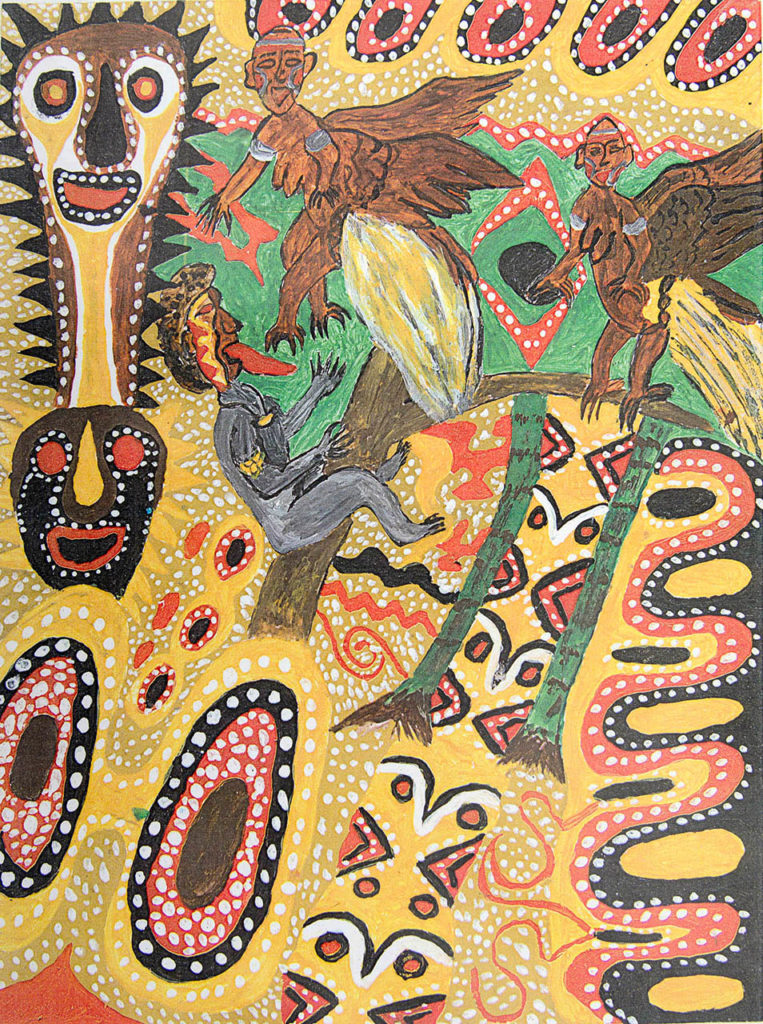
Makapasapa – One head
The head fell on a creek’s water and became a masalai.
Now he lives in this creek, where he calls a lot of fish, to attract people.
One man, waspor, goes into the forest to find greens. Looking for tulip-tree leaves he arrives at the creek. Picking up leaves he hears the fish beating. Eii! He looks down and sees plenty of fish swimming and making noise.
– Tss, I’m picking only leaves, hah, and the creek is full of fish!
In the afternoon he returns home, to his wife.
– Hey, today I saw a lake. The fish are not playing there. It’s full! Tomorrow you get your fishnet basket, and we catch all that fish.
The wife likes to hear this and prepares her fishnet basket.
It’s early morning, and now the two are going. At the creek, the man stays to watch her, while she goes into the water, up to her hips. She walks slowly, upstream, collecting fish. They are happy and don’t notice the water movements, which starts to rise.
It’s up to her belly bottom now, but she’s busy collecting fish. Her man thinks of all the food they’re going to have in the afternoon. In the middle of the creek, the woman keeps going upstream and the water is up to her chest. As she moves, this head, Makapasapa, moves too, following her legs. Eiii! she fills something underwater. What’s here, a giant fish?! I try to catch this big fish. The water is now up to her breasts, and her boobs are floating on the surface. When she bends down with the basket, something bites on her breast! Makapasapa talks now: Na, you go where, and I go where? It’s a local saying, it means: We go together now.
There’s no hope for her. She no longer thinks of all that fish. She comes out of the water with him hanging on her breast and takes him home.
And now they live together. At night, he’s losing her breast and sleeps. In the morning he clings back to it.
Her man wonders how to help her to get rid of it. The two talk and they have a plan now.
He brings sterns of sago leaves and makes a bed. Then he digs a pit and places the bed over it. When comes the night, he puts burning embers into the pit.
And now they all go to bed. The head loses the breast and sleeps. Waiting for this, the man jumps, pulls aside the sterns, and the head falls into the burning ember. Quickly they cover the hole and let the head to burn. The two run away and leave the house and the village.
When he fell, the head quickly rolled aside, digging into the ground, and the embers couldn’t burn him. He’s alive.
Time passes, and now a wild garden covers the place where the house was. The head became a yam. His stern is huge, is a masalai yam. And he’s ready now.
We call it woi, it tastes like yam and taro. Woi is a kind of wild yam, it grows by itself.
Ok, now, this woi, the yam, yes? he grew up big.
One day, a man, waspor, goes into the forest with his bow, to find meat. He sees a yam and stops: that’s a big yam.
He puts the bow and arrows aside, finds a sharp wood, a limbun, and starts to dig. Now he is digging, digging, digging. But the yam goes deeper. The man digs, the yam goes deeper, and so on.
While digging, he’s squatting above the hole. You know, at that time, men were not wearing trousers or anything. He was naked.
So now, as he digs deeper and deeper, the yam also goes deeper and becomes a man! He faces up and sees this something above the hole. He looks at it and trembling starts to jump. Jump, jump and he bites it! Some say that he jumped to the eggs of the man, some say that it was his dick. He jumped to the head of his dick.
The man jerks startled. The yam is a man head, a masalai! Eiii… it can’t be! His thinking is failing him, everything seems wrong. There’s nothing to do. He has to leave with the head hanging between his legs.
Now, the two are walking through the forest. The head talks to him: Father, don’t be afraid. We go home together. You have no other way. Ok, the man thinks he can’t escape, so they go home and sleep.
They are in the village now. How can I get rid of this head? It’s only a head, but is like a man, is a masalai. The man got into big trouble, and he’s stacked with it for a while. Everywhere they go, they stay together. At night, they sleep together, in the morning, they wake up together. Any waste left by the man, when he is peeing or something else, goes into this mouth. When the man is eating, the head talks to him: father, I eat too. And he stays close to him. There is no way to run. The head would run after him, and hold on to his bolls.
But then, he has a thought. When is the time for mango, I get rid of him!
Now, the mango season has come, and one evening, the two talk about getting some. At dawn, they go out, cross the forest and arrive at the base of a big mango tree.
– Father, you go up and shake the branches, I stay here to collect them.
The real man climbs up, shakes the branches, and the head collects the fruits.
– Father, I want more! The man starts to throw mangos, the head runs after them and quickly comes back watching his father: I want more! The man throws the mangos further away, the head gets them and returns to the base of the tree. Eii, this head moves fast! He picks up a mango and throws it to Pagwi (a village downstream of Ambunti). Again, he gets it and quickly comes back. Ok. He throws one up to Wewak (a town on the Northern coast). He gets it and comes back.
He plays like this for a while, but now he knows it. He makes a maus-wind to a kina-shell, or a bamboo blade, and sticks it in a fork of the tree. Then, he throws a mango at Moresby. The mango flies a looooong way, over mountains and rivers, and the head runs and runs after it.
He makes a singsing, climbs down and runs away. He doesn’t stop. He runs back to his place and disappears.
The head is back now.
– Father, throw another one!
– Wait.
– Father, you throw one now!
– You wait, ya.
He waits.
– Father!
– Ya, wait!
– Hey, father you throw one now!
But there is no man throwing mangos. So he jumps on the tree. He is only a head, but he can jump, he moves like the wind.
Now, he’s startled seeing this kina-shell in the fork. Furious, he smashes it and eats it. When finishes he comes down.
He collects all the mangoes, the small-small ones too. Then he picks-up short grass, like the one you find in swamps, where the snakes use to stay. He makes a nest and hides inside. He waits for a cassowary. The mangos are piled like a hill, and he stays inside. The time passes slowly.
A cassowary comes now.
Cassowary use to nibble tree seeds, but when is mango time, they come for it.
Now, a cassowary sees the big pile of mangoes and stops to eat. Eating, it bends the neck, lowering its head, lower, and lower… Suddenly, he jumps straight to the neck!
The cassowary jerks, lays down, gets up, twists and turns, hits it with the strong claw. It struggles to remove him, but no way. The head doesn’t let go.
The two run over mountains and swamps. The cassowary runs fast. Runs, runs, runs, how many mountains, it goes, comes back, crossing all kinds of places, through bush-ropes with thorns, it tries everything to kill him. The head and the cassowary are one.
Running like this, the cassowary spots the sharp roots of a fallen kwila tree pointing out. With all its strength runs and hits the head onto a sharp root. The head cracks and the brain flows out. The cassowary stops to look at it. Then it starts to swallow the brain. The cassowary eats this brain, finishes and leaves.
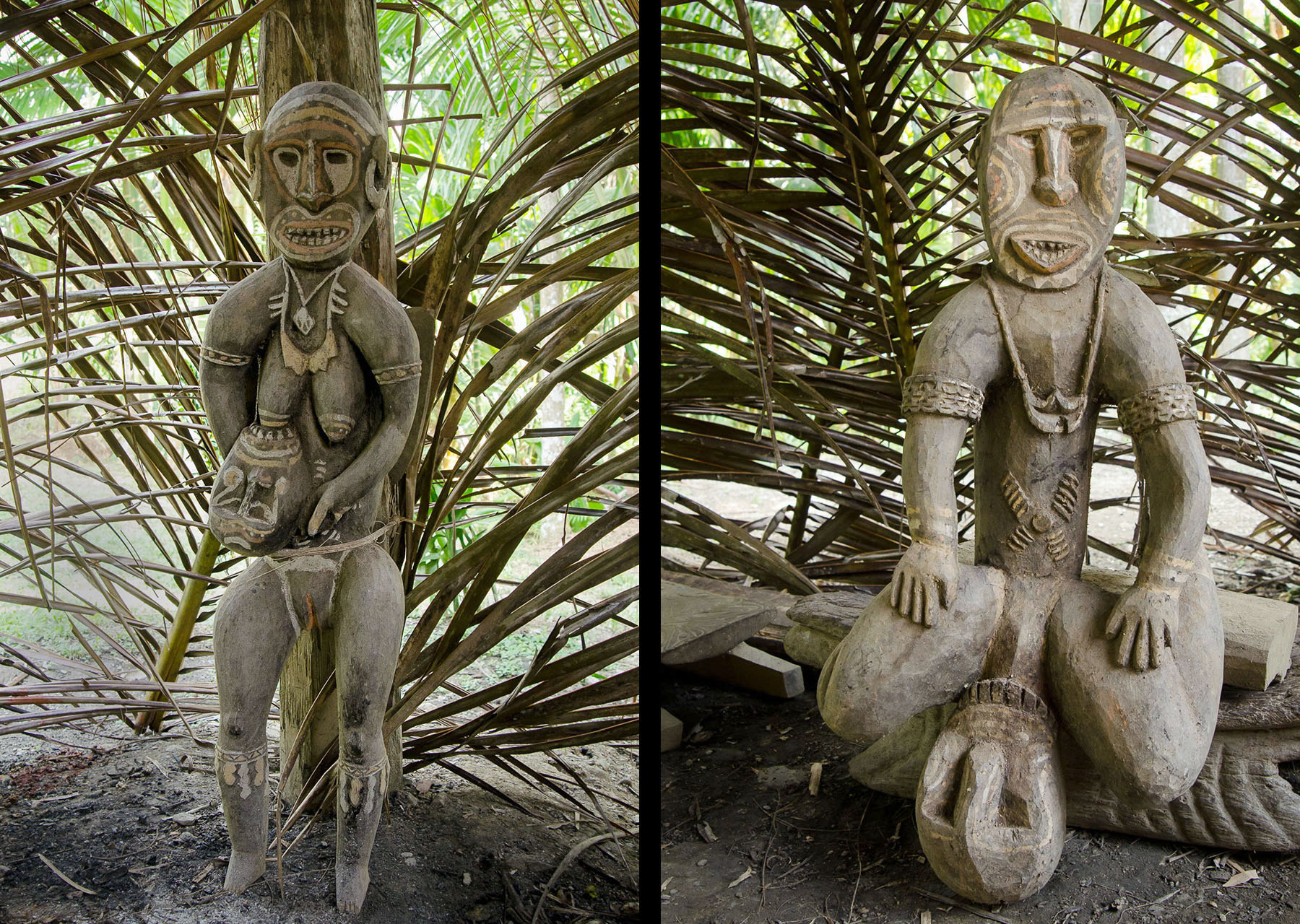
Apyanda – Bird-man
After a while, the cassowary lays two eggs. When comes the time for hatching, a man comes out from one of the eggs. One is a cassowary, the other one is a boy, a real human.
She collects for them all kinds of seeds she can find in the forest, but the man-cub doesn’t eat any. One day, she takes them to an old garden, where they find bananas. She peaks up a few, and the cassowary eats them. Then she gives some to the man-cub, and he eats them too. Ooo, he likes bananas. Good. He is a man, he can eat bananas. And so, they start to go to this old garden.
Now, the father of this garden walks through the forest. He is a man from the village, who left to find meat and greens. He comes to check their old garden.
Ei, a cassowary was here! He spots the cassowary footprints. Oh, they messed up all these bananas. Then he sees… Eiii! Ei, these are real man feet! A child?! What kind of man walks together with a cassowary?
He digs a pit, close to a banana tree, and covers it with small sticks and leaves.
The cassowary is going to eat now, and the boy falls into the trap. Screaming, the cassowary stretches a leg down into the pit, to get the boy out, but he can’t reach her leg. She screams, and screams, and stretches her leg down the hole. But there’s no way for the boy to hold on to it. And she keeps struggling like this, at the base of the banana tree, in the old garden.
Back in the village, after a few days, the man thinks of his trap. I must go to check it.
Now, as he comes to the garden, hears the cassowary’s screams. Ow, the trap I made, a cassowary must have fallen in. He hurries-up, and when he arrives, he sees the boy inside! The boy is down the hole, and the cassowary is agitating angry.
– I’m sorry, says the man. I will take him with me and I will look after him. I won’t hurt him.
Mama cassowary keeps screaming sad.
– Hey, stop! For you would be hard to look after him. I take him with me, our bodies are of the same kind.
Her feathers are raised, she is angry, so the man doesn’t go close to her. He walks around, easy-easy, and pulls out the boy.
He takes the boy back to the village, and the cassowary disappears into the forest.
And now, they are living in the village. The man and his woman have a boy of the same age as the boy brought by the cassowary. The two are always together. They go to catch fish, go to the gardens, go into the forest, and every day they bring food at home.
Time passes. Each time the boys go out for food, the cassowary boy does all the work. He gathers all kinds of food, gives it to the man’s boy, and together they come back. At home, the man’s boy is saying: he doesn’t do anything, he doesn’t know to find food. I work for it, he only comes to eat.
As they keep going and coming, the story is always the same.
The man’s boy is called Mayanda and the boy from the cassowary Apyanda. Ma- is for man, ap- is for bird, -yanda is for child/children, in Kwoma language.
Apyanda was not talking too much. He was listening and waiting.
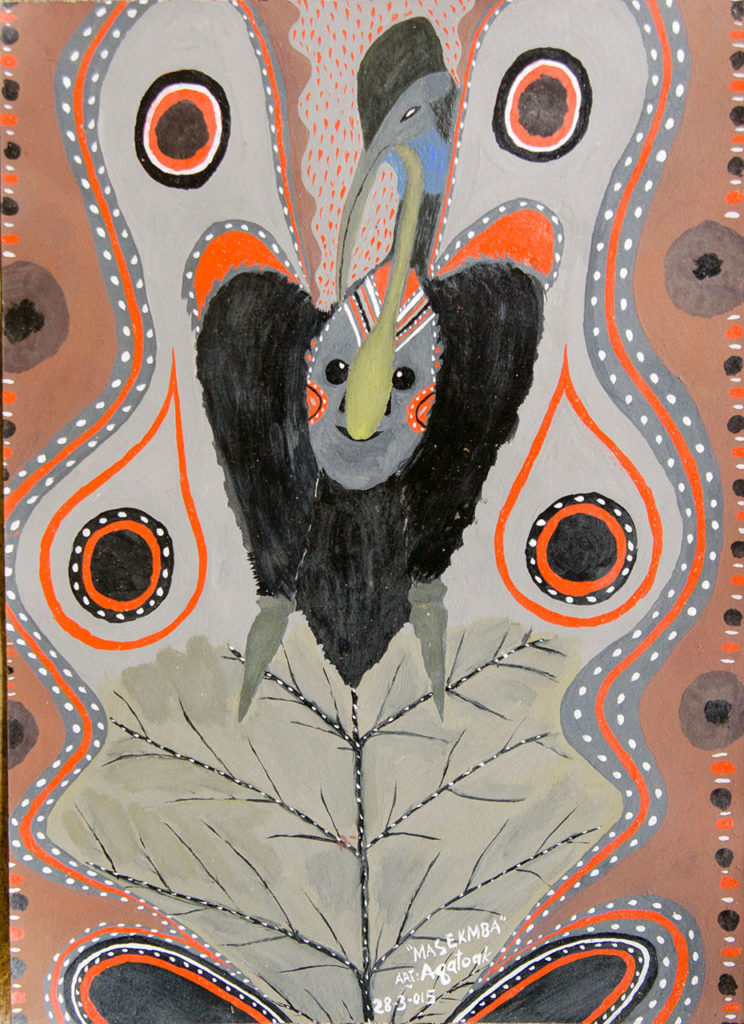
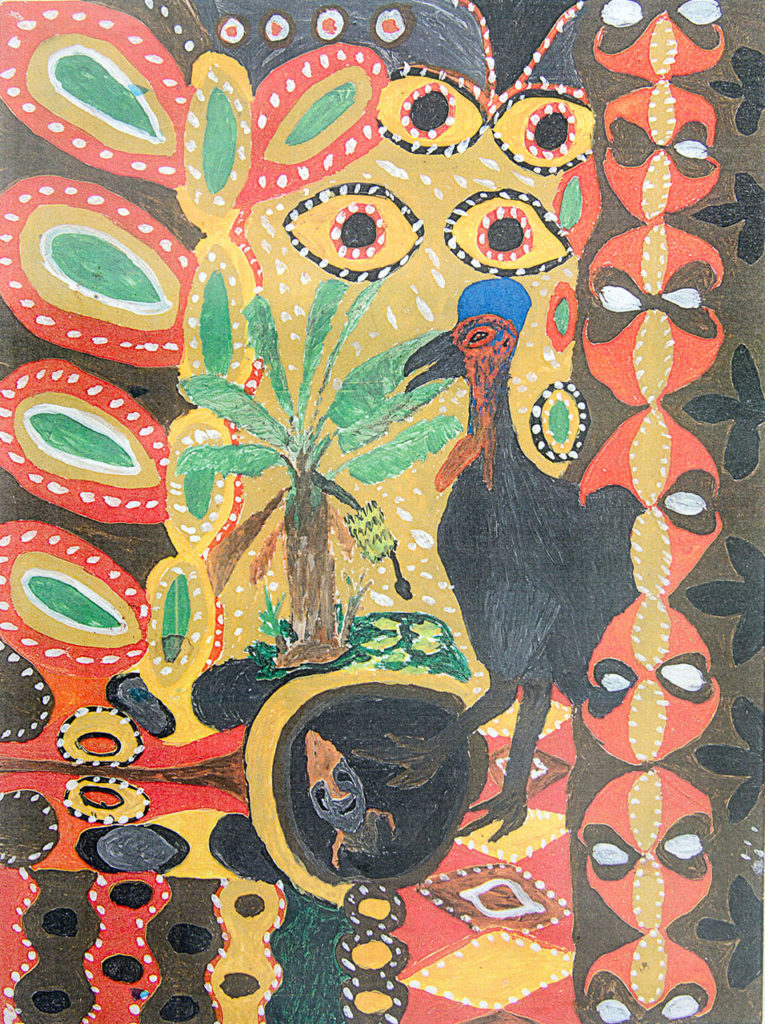
One day, the two go and dam the water to catch fish. At dawn, they walk along a creek and find a place. They built a dam and remove all the water left on the creek. They work, and work, and work, and catch plenty of fish.
They finish, and now, Apyanda kills Mayanda. He digs a hole, puts the body inside, and covers it. He plunges a stick into the ground, and then brakes the dam, allowing the water to flood the creek.
After finishes, he takes the fish and returns home.
– And he? They ask him.
– I don’t know. I was alone. He took a different road.
The two wait all night.
Next day now. Before the light, the two are ready to go into the forest to search for him.
When finds himself alone, Apyanda scrubs the morota, the garamut, the house’s posts, the ground, the tambaran, everything. He takes a little bit of dust from everything, packs it, and puts it in his bilum (string bag). He takes also these flowers, which we use, they look like a rooster’s head, and packs them too. He scrubs and packs, scrubs and packs.
Now, the two find the place where the two have made the dam. They see a kingfisher staying on top of a stick, in the middle of the water. Hmmm, there must be something there. He must have killed him there.
The boy left the stick, to show them the place.
The two dam the water and they look now. Ooo ya, he buried him here. They grab a stick and dig. They turn the ground and cry. They remove all the mud and find the body.
Now, the two cry and walk through the forest with the body. They get close to the village, and the boy hears them. They are close, there is little left until they arrive… And he jumps on a banana tree! The tree bends and throws him on a breadfruit tree, which throws him on a sow tree, which throws him on a palm which throws him a looooong way to an arima tree.
– Arima is a big tree, you see it on Sepik, it has white leaves, we carve canoes from it.
And now, he stays on a fork of this tree.
The two are mourning at home. What else to do?
It’s afternoon. On the fork of the tree, he puts a leg around it and sits. Is getting dark now. From his bilum, he removes the small packages, and rubes them on the bark. He rubs one leaf and throws it, rubs another one and throws it, and so on.
His eyes are sleepy, it’s the middle of the night. He falls asleep, and the wind starts to blow. It blows stronger, bending the tree, and in his sleep he startles, feeling he’s about the fall down. With eyes closed, he stretches one hand and feels ground around him. Ooo, in the morning I’ll see what happened… He sleeps, sleeps, sleeps, the wind blows, and again when he is about the fall down, there’s something next to him. And he sleeps like this all night, winding with the tree.
The dawn break now. The wind stops. At the first light, he sees: a tambaran appeared there! And there’s ground and all his things. He looks around, a small water spring is there too, besides the tambaran.
And now, he singsing. Singsing, singsing, singsing, beating the garamut inside the haus-boy. All the things he had scrubbed, he rubbed on the tree, their dust fell a looooong way down, and another village came into being, on the tree.
Now he’s beating the garamut, chews betel nuts, shell kembang (penis sheath made from a big shell). He’s spreading the news. One man!
In the middle of the forest, in this arima tree, the singsing goes on. But it’s no longer a tree, it becomes like a mountain with a settlement on top.
– Here, if you ask papa Kaipuk, he will tell you up to this part, halfway. This is their story, it belongs to Wani Clan. When this arima tree breaks and Sasaap comes, the story belongs to Gusem Clan.

Sasaap
Now, some young women from a village are going into the forest to catch ground spiders, and they hear it…
– Birds eating spiders. Big, black ones. Children and women catch them. They bring beetles, from sago grubs, you know they fly, so they tie them and hold them at the hole, to catch the spiders.
Ok. So they go now to find spiders. As they walk through the forest, they hear a garamut. Ei, what is that? What man? Which clan singsing?
There are maybe 10 or 20 women. They arrive at the place where the sounds come from. It’s difficult to climb all that way up, but now they know: there is a man there.
When he knows they come, he singsing happy. He finishes, puts down the garamut stick and comes out.
– Hey, you?!
– We heard the singsing and came this way to see. Is there any village up there?
– No, I’m alone here. I’m one man.
– Eiii, we heard many people singsing.
– No, I live alone.
He starts to singsing again, and they all stop to listen.
– Hey, we want to come up there!
– You want to come up here, ok, you find a way, and you come up here!
He is busy beating the garamut. He is beating, beating, beating. He finishes and looks down again. They are still calling him.
– So you want to come up here?! I’ve nothing here, I’ve no food to give you, I’m one man, it’s difficult to live here!
– No worries, we want to come up! We want and stay with you!
His singsing has powers, it stirs-up the women’s guts. They can’t stay still, they all want to go up and singsing with him.
Now he tells them: you stand up in a line. And they form a line. He is looking and he sees the body of two of them has hair.
– You two, you stay there.
The other ones are to young. They are for other men. He takes only the good ones.
– Hey, me too, I want to stay with them! Me too! Me too! the other women are saying.
– No. You are still too yang, you belong to other good men.
Now, the two: hey, how will we climb there?!
He tells them to come and stand bellow him. Ok. Now he spits, and his phlegm stretches down to the ground.
– How do we tie to this phlegm?
– You tie it like this, between your legs.
She put the phlegm in between her legs, it goes inside, and he pulls her up.
– Ei, me too, me too!
– Yes you too, just stand up there. You do the same. How you tie it, you tie it.
He shoots her to, it goes inside, and he pulls her up.
– We too, we too! ask the other ones. They call, and call, and wait, but nothing.
He takes up only two women. And now they stay there, and singsing.
It’s afternoon now, and two feel hungry. But there’s nothing to eat. He says: I don’t have food, I live like this.
He asks them to put some water to boil, but they don’t see any. Yes, I know, it’s difficult up here, you have to go far, that way, to fetch water.
They go, and go, and go, and keep looking and looking, but they find nothing.
– An airplane could take them up in the sky, and still, they would find nothing.
When the two are away, he goes right behind the haus-boy, wipes out some water lilies and fetches water from a well. He brings the water, and sits in the same place, waiting for them.
Each time when the two need something, he sends them away.
Now they are back, he gives them water to pour in a pot and to put it on the fire. One of them says: there is no meat. There is no this, there is no that…
He brakes these flowers and throws them in the pot. He takes one, brakes it, throws it. He takes another, brakes it, throws it. He finishes, covers the pot, and let them boil.
The two ask: ei, what do we eat?
– Go check it.
– But there’s nothing, just water!
– Go and check.
One gets up, looks in the pot, and: Ei! A yam is there. The other one goes too: Ooo, there is meat!
The greens became pork meat.
And now, they live there like this. The two, they don’t know there is something in that place. They relax and eat. And each time it happens the same.
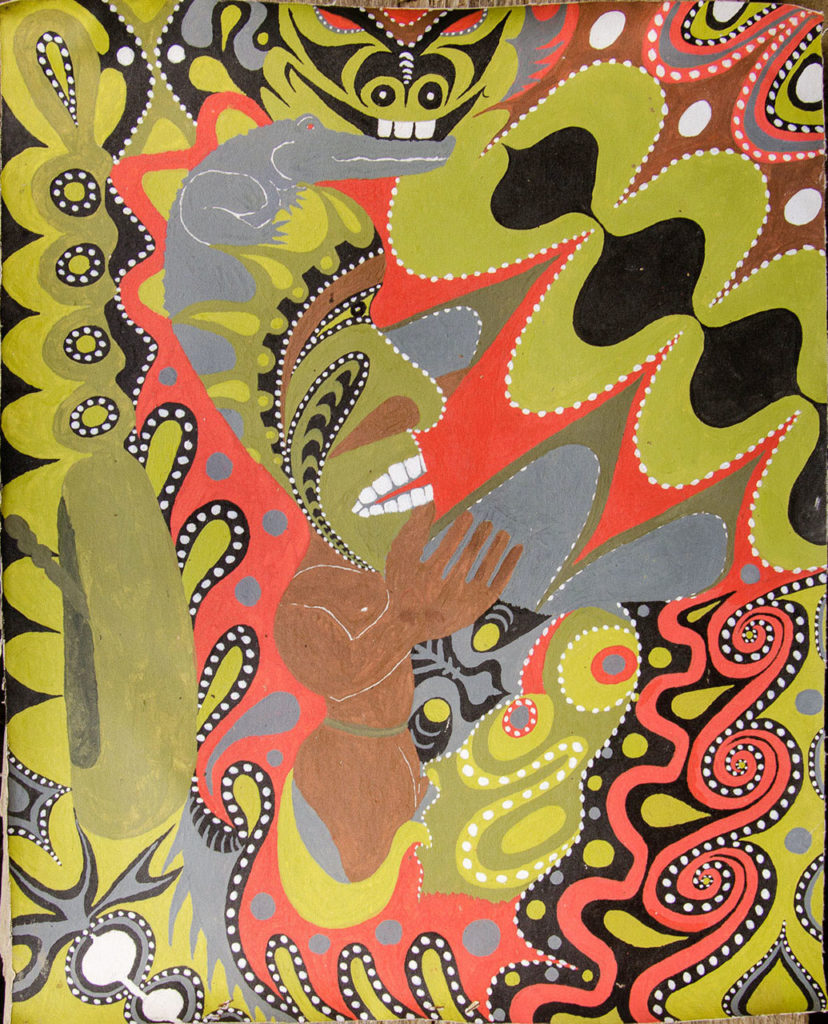
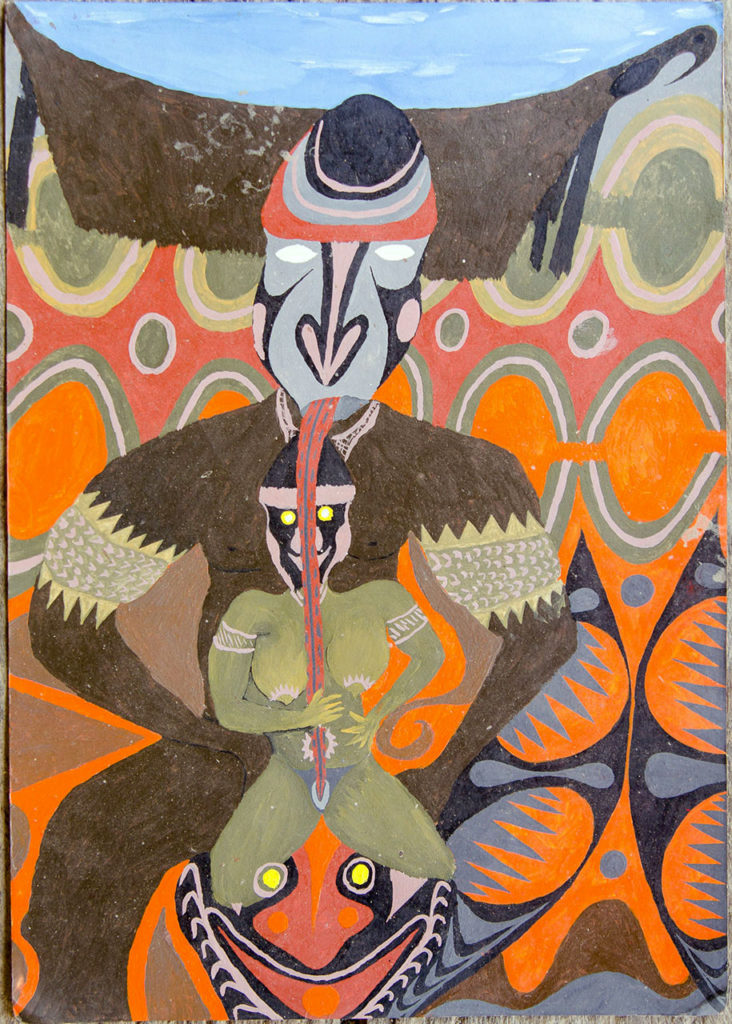
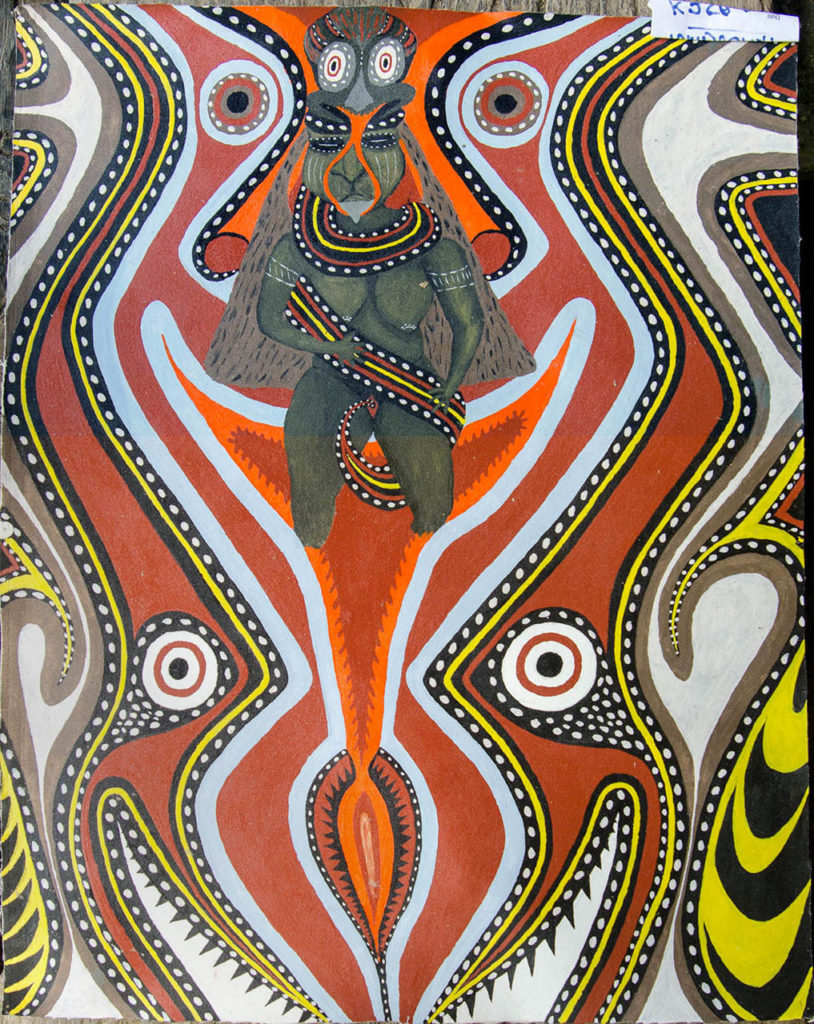
Now, a friend of his comes.
– It was one of these animals, like Irmang, the cuscus, or Apkwas, the flying fox, or Tarankau, the vulture… Who came first?
– We forgot how he looked like. It was a spirit man, looking like an animal.
Ok, now this friend comes and tells them: we got a singsing. They mark the day on a rope, and he goes. I think there were two or three days.
Then, another one comes. Waniwanga the pig: I came to let you know at this time we singsing. He marks the day and leaves.
They are getting ready to go to singsing when Irmang comes to visit them. He tells them: oh, my stomach hurts, I’m sick. Now, Sasaap is committed to going to singsing, but he doesn’t like to let Irmang alone in his house. He has all those things there, behind the haus-boy… He asks the number one wife to stay to watch the house. But she doesn’t want to. He asks the number two. No, I also want to go to singsing. We, the women will twist and spin and sing, the singsing dance… Ok. The man is not against it, but an uneasy feeling grows inside of him.
– Sasaap is Apyanda? (me)
– Yes, Sasaap is also Apyanda. (Kowspi)
He talks to his wives: I asked you to stay, you don’t want to stay. All right, we go together.
They prepare sago for him, boil some greens, some aibica which becomes pork meet, and leave coconuts for him to drink.
Then he talks to him: you stay. It is taboo to touch something! If you hear some noise, it’s a strong taboo to walk around. You stay only inside. You have a headache, your stomach hurts, you are sick. You must stay and sleep. We prepared everything you need, you don’t need to go out.
He talks to him so that the women cannot hear it.
They decorate themselves, tie all the feathers, from cassowary and other birds, rings, colorful leaves, shells, put the makeup and they go. They all singsing now.
The singsing is in full swing. Men and women from all the forest clans, these birds and animals, gather to singsing. Beating the garamut and kundu, chewing betel, they sing and dance. This headdress of him, made of cassowary feathers, gets broken. In the middle of singsing, he feels his cassowary headdress falls apart.
Now, he no longer singsing, he stands aside. He’s worried and tries to figure it out. Something bad must have happened. Other clans come to ask him, he tells them: no, there’s something at home. My place must have a problem, I must go back.
Irmang, the cuscus, drinks all the water, finishes everything and falls asleep.
Now, he sleeps and hears something. As if frogs are croaking close to the house. Tcik, tcik, tcik, tcik. In the night, it sounds like coming from a swamp: tcik, tcik, tcik, tcik. Tcik, tcik, tcik, tcik. Eiii! Something is there, behind the haus boy. Where is water, you hear sounds like this.
He wakes up and walks around the place. There must be water… And now he finds a well. He removes all the grass and leaves, the water lilies, and he wants to have a look into the dark water.
That well… There is a yam in the water. It has plenty of thorns. It’s a masalai yam living in that water. He faces down, trying to look at it, and in that very moment, it bursts into pieces, shoots him with splinters and smashes him! Everything breaks up from this well. Crocodiles, turtles, catfishes, all kind of things surge from the deep water hole! Irmang dies, and the water breaks out, like a waterfall. A tide is running now, it takes the whole place down and becomes a lake.
The masalai yam, Kowspi, killed Irmang and rubbed himself with the blood of Irmang. Kowspi is this story. It has two meanings. Blood and hitting someone. When you shoot a man, blood comes out.
It’s morning, and the three are coming now. Number one, number two and Sasaap. They arrive at their place and see the lake. It can’t be!
They find some ash and spread it on their skin. They are mourning.
Sasaap jumps on a floating wood and becomes a heron. The number one wife becomes a water duck. You can see the design on her face, the lines from the singsing makeup. The number two stands aside, and becomes a banana tree.
The water carried out all the yams. The best yams came out of this and floated down to Maprik. Here, in Tongujamb, we have small yams, the big ones were carried by water. In those places, you can go to check this story, everyone will confirm it. The yams have come this way, on the water.
If you go to Tongujamb, papa Kaypuk will show you where Sasaap came, and where he was destroyed.
Now all the singsing are related to yam. The one who works hard to get the big yams, when he takes them out, he brings them to the haus-boy. It’s the sacrifice he makes, and his yam becomes a big man. Singsing comes at the time of harvesting these yams.
(The yam is the staple food for the hill people around Maprik. Their tambarans, singsing and stories revolve around the yam cult. Up to these days, the Sepik people meet the Maprik people in a busy weekly market, to trade dry fish and sago for yams.
Here is the Abelam myth story related to this one. I posted photos of the yam cult houses here: Abelam spirits houses, gods and yams. )
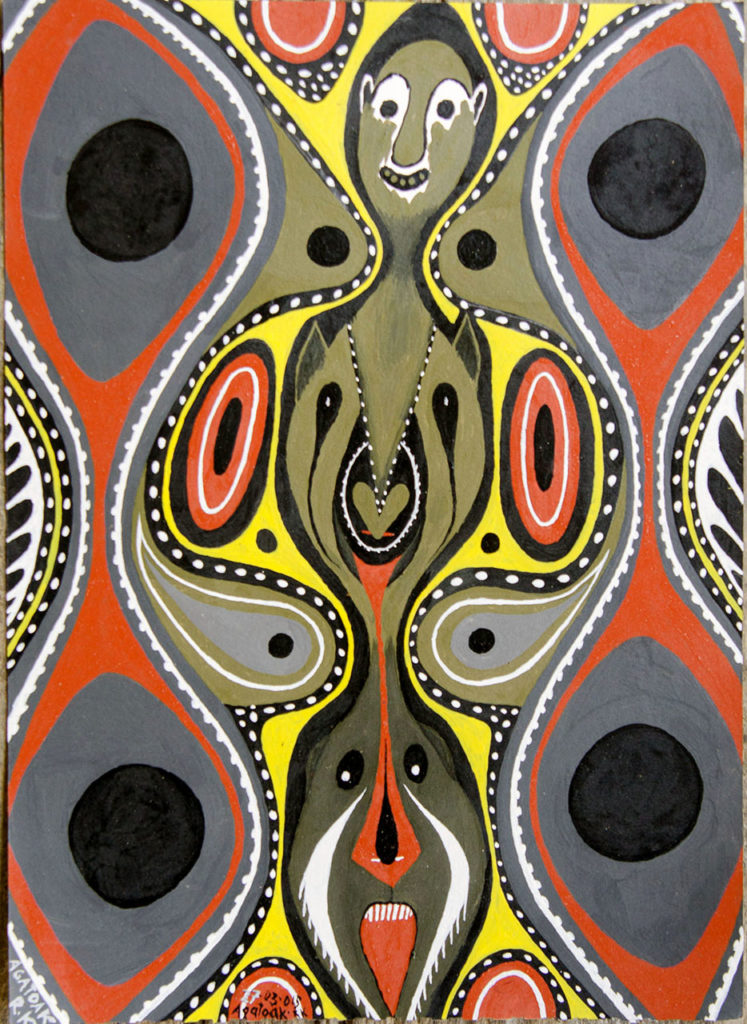

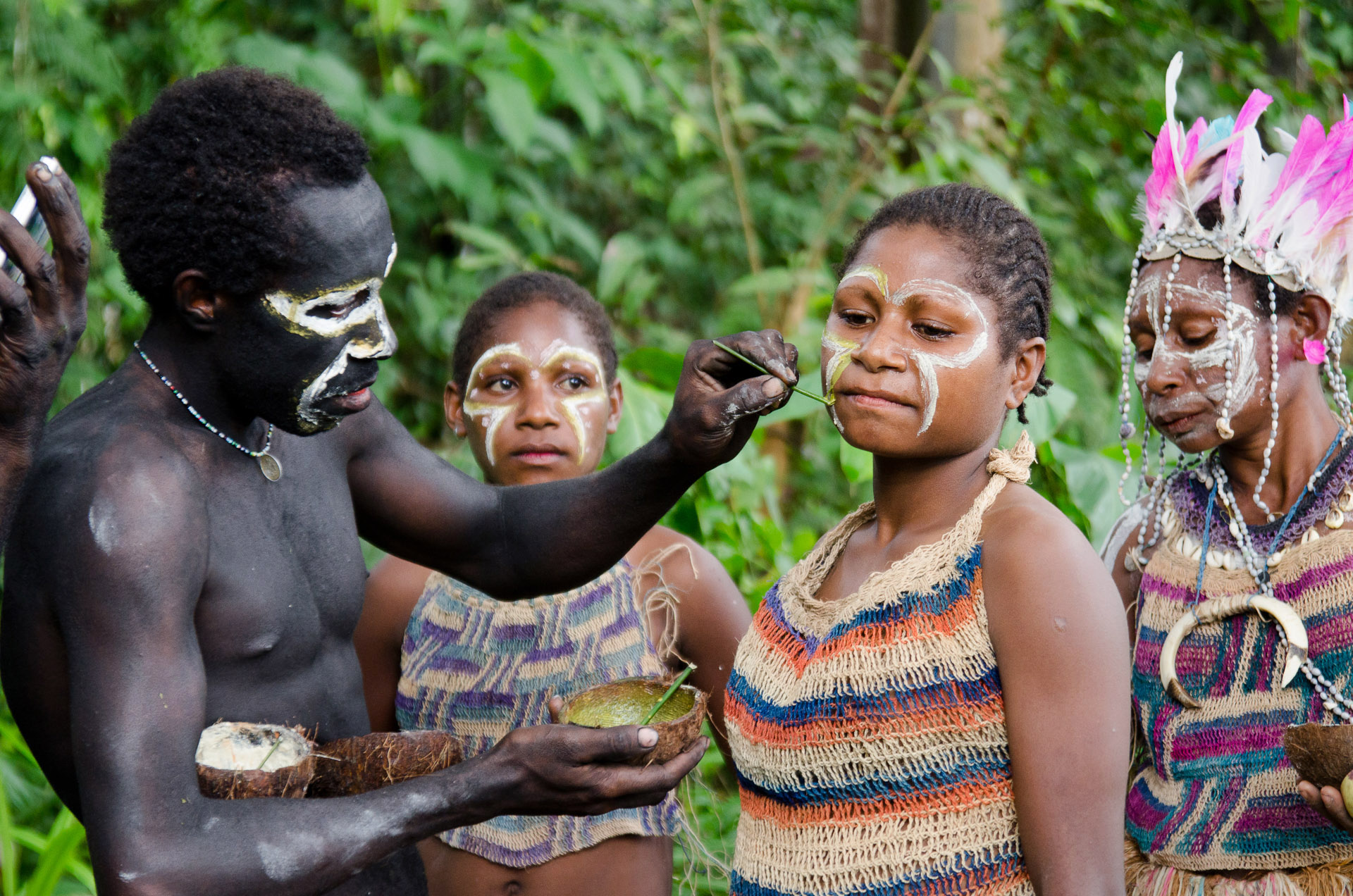
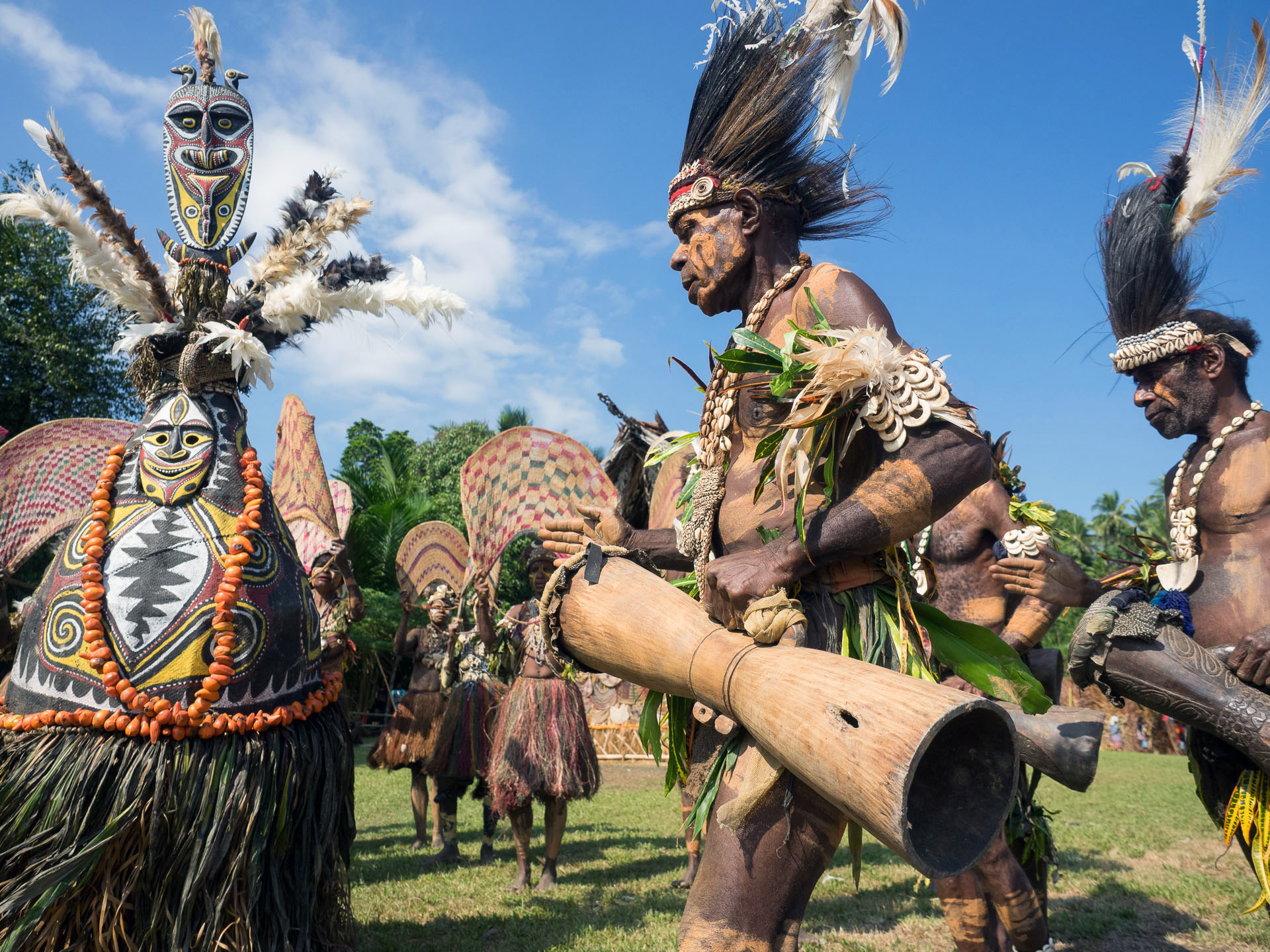
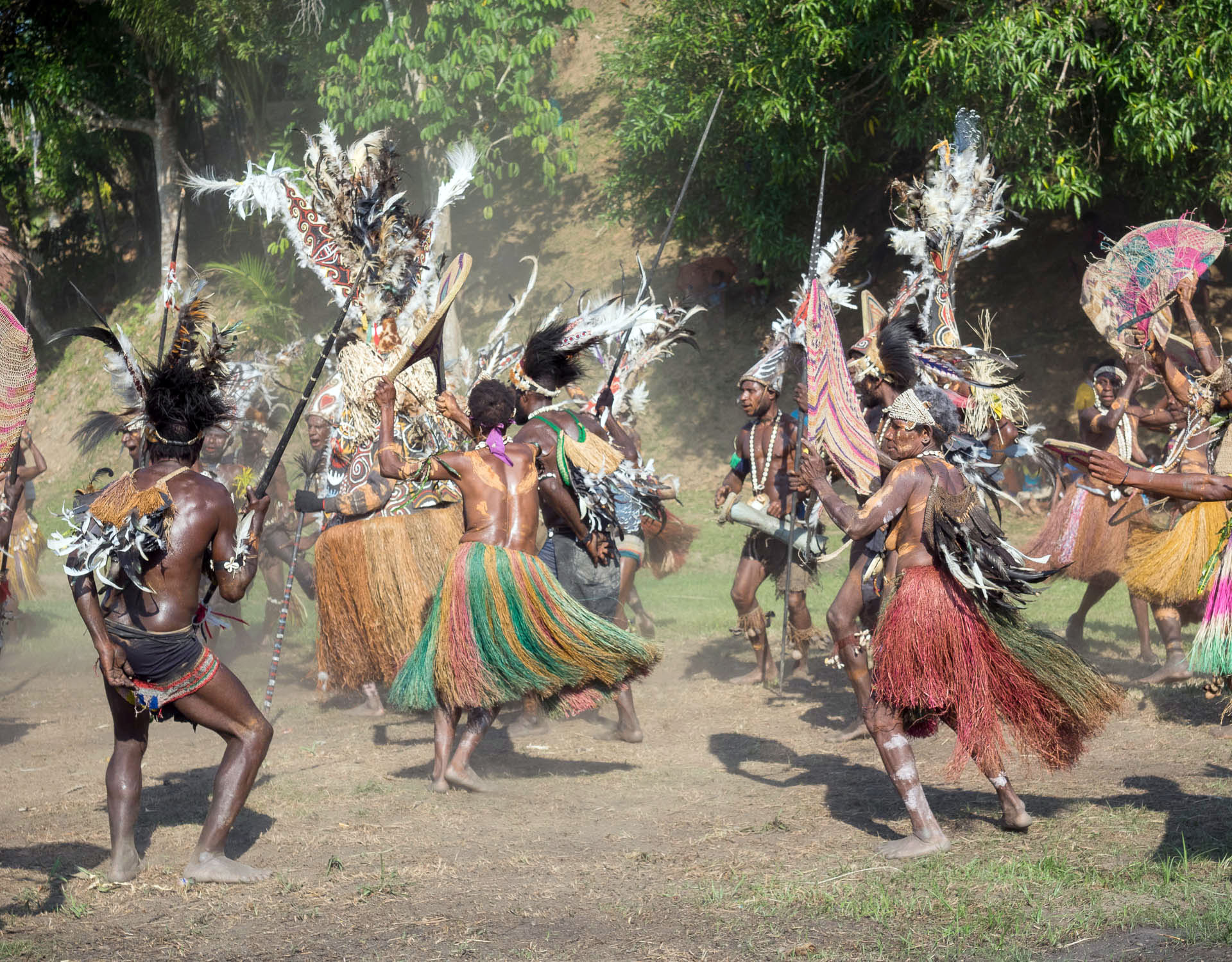
Yes the Legend is true!
Here I am Agatoak Ronny Kowspi. Apart from all this, if you need more information and paintings, please this is my email address: ronnykwospi@gmail.com.